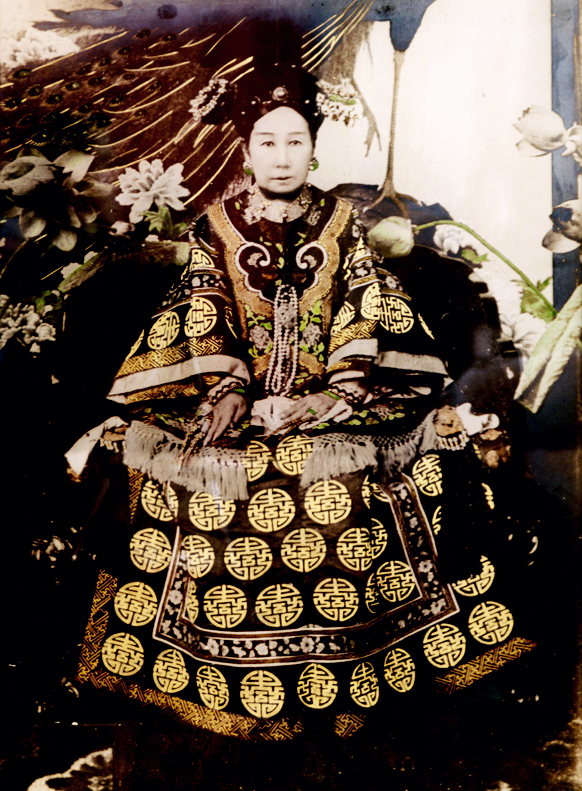<
 Emperor Xianfeng reigned during a troubled period in Chinese history. Domestically, a widespread famine caused the Taiping Rebellion in southern provinces, while international threats – Britain and France – invaded China, beginning the second Opium War. In the face of all this turmoil, emperor Xianfeng died in 1861 at age 29 leaving Cixi’s five-year-old son as the imperial heir. Knowing that the incoming emperor was merely a child, Xianfeng selected eight men to form a Board of Regents to rule in his son’s behalf until he came of age.
Cixi saw this unstable transfer of power as the ultimate moment to ascend to the throne herself. Together with empress Zhen and with the support of two of Xianfeng’s brothers; Prince Gong and Prince Chun, they planned a coup to remove the Board of Regents from power.
The story goes that the regents were dismissed for having carried out incompetent negotiations with the “barbarians” which had essentially led to the death of Xianfeng. This was of course high treason and five of the eight men were imprisoned, two were ordered to commit suicide and one was executed. Thus, begins the reign of Cixi – Empress Regent of China.
The country was under pressure from various foreign power, and ministers were divided between those who opposed the Westerners and those who wanted to modernize China to boost its economy. Cixi was one of the latter, favoring westernization. Among her achievements was the construction of a railroad network to foster international trade with China.
Cixi had to stand down, officially, in 1873 when her son came of age. The young emperor was, however, killed by smallpox two years into his rule. Some believe that Cixi poisoned her own son to cling to power, but no proof of this exists.
Essentially, Cixi became the regent again. She adopted the son of her sister and crowned him emperor Guangxu (who was barely three-years-old). This gave her the time and the power to embark on a second wave of modernization, introducing electricity and coal mining.
She officially ceded power to emperor Guangxu in 1889, however, he proved to be an insufficient ruler. His failure to comprehend modernization led to China’s crushing defeat against Japan in 1895. Cixi, once again, took the reins of government. On November 14, 1908 she installed Puyi as the new emperor and merely one day later, on November 15, 1908, she died in the Hall of Graceful Bird and the Middle Sea (中海儀鸞殿).]]>
Emperor Xianfeng reigned during a troubled period in Chinese history. Domestically, a widespread famine caused the Taiping Rebellion in southern provinces, while international threats – Britain and France – invaded China, beginning the second Opium War. In the face of all this turmoil, emperor Xianfeng died in 1861 at age 29 leaving Cixi’s five-year-old son as the imperial heir. Knowing that the incoming emperor was merely a child, Xianfeng selected eight men to form a Board of Regents to rule in his son’s behalf until he came of age.
Cixi saw this unstable transfer of power as the ultimate moment to ascend to the throne herself. Together with empress Zhen and with the support of two of Xianfeng’s brothers; Prince Gong and Prince Chun, they planned a coup to remove the Board of Regents from power.
The story goes that the regents were dismissed for having carried out incompetent negotiations with the “barbarians” which had essentially led to the death of Xianfeng. This was of course high treason and five of the eight men were imprisoned, two were ordered to commit suicide and one was executed. Thus, begins the reign of Cixi – Empress Regent of China.
The country was under pressure from various foreign power, and ministers were divided between those who opposed the Westerners and those who wanted to modernize China to boost its economy. Cixi was one of the latter, favoring westernization. Among her achievements was the construction of a railroad network to foster international trade with China.
Cixi had to stand down, officially, in 1873 when her son came of age. The young emperor was, however, killed by smallpox two years into his rule. Some believe that Cixi poisoned her own son to cling to power, but no proof of this exists.
Essentially, Cixi became the regent again. She adopted the son of her sister and crowned him emperor Guangxu (who was barely three-years-old). This gave her the time and the power to embark on a second wave of modernization, introducing electricity and coal mining.
She officially ceded power to emperor Guangxu in 1889, however, he proved to be an insufficient ruler. His failure to comprehend modernization led to China’s crushing defeat against Japan in 1895. Cixi, once again, took the reins of government. On November 14, 1908 she installed Puyi as the new emperor and merely one day later, on November 15, 1908, she died in the Hall of Graceful Bird and the Middle Sea (中海儀鸞殿).]]>

